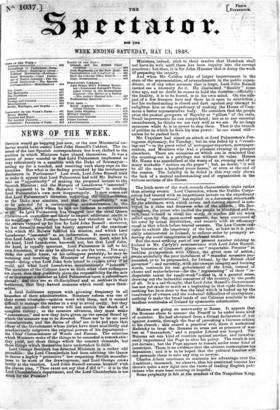NEWS OF THE WEEK.
Orrice would go begging just now, or the new Ministerial em- barras would have ousted Lord John Russell's Cabinet. The in- terest of the last Spanish correspondence has been shifted to the position in which Ministers have placed themselves. It was a source of some scandal to find Lord Palmerston implicated so very ridiculously in a squabble with the Duke of Sotomayor- setting up for a teacher, and receiving such sharp raps on the knuckles. But what is the feeling provoked by the involuntary disclosures in Parliament! Last week, Lord John Russell tried to make it appear that Lord Palmerston had told Mr. Bulwer to take an "opportunity" of making the proposed lecture to the Spanish Minister ; and the Marquis of Lansdowne "lamented" what appeared to be Mr. Bulwer's "indiscretion" in sending Lord Palmerston's own note inopportunely. It now comes out that Lord Palmerston's direction respecting the communiaition to the Duke was absolute, and that the "opportunity" was to be selected for a corresponding cotnmunielition to the 4/ueen-.Mother, with whom he la.ed. no- business to communicate st# So Lord Palmerston has "dragged into the cabal Queen Clint:lane—a councillor not likely to impart additional credit to his mecl_dlinire Our Foreign Secretary had therefore no right to the excuse vamped up for himby Lord John Russell: moreover, he has formally recorded his hearty approval of the exactness with which Mr. Bulwer fulfilled his mission, and which Lord Lansdowne "lamented" as an indiscretion. It seems not only that Lord John's right hand, Lord Palmerston, doeth what his left hand, Lord Lansdowne, knoweth not, but that Lord John, the bead, is equally ignorant. Lord Palmerston is left to his own discretion, it' we may be allowed to use the term. For any- thing the public know, or his colleagues probably, he may be lecturing and insulting the Ministers of foreign countries- all round—doing what Lord John feels bound to explain away if he could, and what Lord Lansdowne conscientiously "laments." The members of the Cabinet know so little what their colleagues are about, that they positively place the responsibility for the acts of so important a member as Lord Palmerston upon a subordinate abroad; arid they are so ill-disciplined and so reckless in their feebleness, that they hazard censures which recoil upon them- selves.
A fatal feebleness appears with growing frequency in all branches of their administration. Sanatory reform was one of their surest triumphs—opinion went with them, and it seemed difficult to manage the matter in a way to avoid credit: but they dare not succeed—their nerves will not sustain the shock of a complete victory; as the measure advances, they must make "concessions," and now they have given up the special Board by which the measure was to be directed. There are to be no paid Commissioners, and the duties of chief are to be put upon that officer of the Government whose duties have most manifestly and mischievously outgrown the original powers of his department— the Chief Commissioner of Woods and Forests. The selection which Ministers make of the things to be conceded is remarkable : they yield, not those things which the country demands, but those things which themselves have undertaken to fulfil. , Lord George Bentinck has detected Ministers in a rather odd peccadillo : the Lord Chamberlain had been advising the Queen to decree a highly "protective" law respecting British manufac- tures to be worn at the drawingroom, and Lord George crows lustily at the reaction. Lord John Russell excuses himself with the craven plea, "Thou canst not say that I did it " : it is in the Lord Chamberlain's department, and the Lord Chamberlain is too much for the Premier ! Ministers, indeed, stick to their resolve that Horsham shall not have its writ until there has been inquiry into the corrupt practices : but then, it is Sir John Hanmer that is doing the work of preparing the inquiry.
And when Mr. Cobden talks of larger improvement in the state of the representation, of retrenchments in the public expen- diture, or of any other measure that is large, Lord John Russell cannot see a necessity for it. He disclaimed "finality" some time ago and no doubt he ceases to hold the doctrine—officially : the finality, it is to he feared, is in his own mind. On the sub- ject of a few freemen here and there he is open to conviction ; but his understanding is closed and dark against any attempt to enlighten him on the expediency of making the House of Com- mons a better representative body. He considers that the people prize the poorest gewgaws of Royalty as "pillars" of the state. Small improvements he can comprehend; but as to any essential amendments, he thinks we are very will as we are. So no large measures while he is in power to stop them. That is the branch of politics in which he feels his true power : he can stand still— unless he be pushed back.
Mr. Urquhart had aimed an attack at Lord Palmerston's Por- tuguese diplomacy, for Tuesday; but he was foiled by a " count- ing-out"—to the great relief of newspaper-reporters, newspaper- readers, and Members who had a pleasant evening in prospect elsewhere. There are occasions on which one is reminded that the counting-out is a privilege not without its value. Honest Mr. Hume was scandalized at the waste of an evening and of so many workable " notices on the paper" ; but, no doubt, " it will be all the same a hundred years hence," or even at the end of the session. The liability to be foiled in this way only shows the lack of a mutual understanding and of organization in the various sections of the House.


























